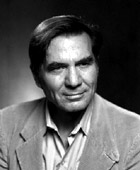Galway Kinnell is an American poet born in 1927 in Providence, Rhode Island. His books of poetry include What a Kingdom It Was (1960), Flower Herding on Mount Monadnock (1964), Body Rags (1968), The Book of Nightmares (1971), Mortal Acts, Mortal Words (1980), Selected Poems (1980), The Past (1985), When One Has Lived a Long Time Alone (1990), Three Books (1993), Imperfect Thirst (1996), and A New Selected Poems (2000). The first Selected Poems won both the Pulitzer Prize and the National Book Award, while A New Selected Poems was a finalist for the National Book Award. He has also published translations of Yves Bonnefroy, Yvanne Goll, François Villon, and Rainer Maria Rilke. A collection of interviews, Walking Down the Stairs, was published in 1978.
Kinnell claims that as a youth he was turned on to poetry by Edgar Allan Poe and Emily Dickinson, drawn to both the musical appeal of their poetry and the idea that they led solitary lives. The allure of language and social separation spoke to what he describes as a rather homogenized atmosphere of the town he grew up in, Pawtucket, Rhode Island.
He traveled extensively in Europe and the Middle East, and went to Paris on a Fulbright Fellowship. It was the 1960s though, and the Civil Rights Movement in the United States caught his attention. On coming back, he joined CORE (Congress of Racial Equality) and worked on voter registration and workplace integration in Hammond, Louisiana. This effort got him arrested, which he recalls in his book-long poem The Book of Nightmares, which was also influenced by his thoughts of the Vietnam War (Kinnell was an active protestor).
While much of his work seems to deal with social issues, it is by no means confined to them. Some critics have pointed to the spiritual dimensions of his poetry, and others focus on the nature imagery he often uses. “The Fundamental Project of Technology” deals with all three of those elements, creating an eerie, chant-like and surreal exploration of the horrors atomic weapons inflict on humanity and nature. Sometimes Kinnell often utilizes simple and brutal images (“Lieutenant! / This corpse will not stop burning!” from “The Dead Shall be Raised Incorruptible”) to address his anger at the destructiveness of humanity, informed by Kinnell’s activism and love of nature. There’s also a certain sadness in all of the horror—“Nobody would write poetry if the world seemed perfect.” Yet, there’s also optimism and beauty in his quiet, ponderous language, especially in the large role animals and children have in his later work (“Other animals are angels. Human babies are angels”), evident in poems such as “Daybreak” and “After Making Love We Hear Footsteps.”
He is now the Erich Maria Remarque Professor of Creative Writing at New York University and a Chancellor of the American Academy of Poets.
Biography by: This article is licensed under the GNU Free Documentation License and uses material adapted in whole or in part from the Wikipedia article on Galway Kinnell. |






